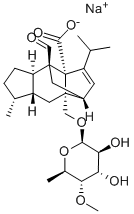Description
Sordarin is an inhibitor of fungal protein synthesis originally isolated from
S. araneosa. It binds to elongation factor 2 (EF-2) in the presence of ribosomes and inhibits the uncoupled GTPase activity of equimolar mixtures of EF-2 and ribosomes from
C. albicans (IC
50 = 0.1 μM). Sordarin inhibits protein synthesis in cell-free lysates of
C. albicans,
C. glabrata, and
C. neoformans (IC
50s = 0.01, 0.2, and 0.06 μg/ml, respectively) but not in rabbit reticulocytes (IC
50 = >100 μg/ml). It inhibits the growth of
C. albicans (MIC = 8 μg/ml) but not
C. glabrata or
C. neoformans (MICs = >125 μg/ml).
Biochem/physiol Actions
Sordarin is an antifungal metabolite possessing a tetracyclic diterpene glycoside structure. It is a highly potent inhibitor of eukaryotic protein synthesis with selectivity for the fungal translation machinery. The elongation factor EF-2 is the molecular target for sordarin. It blocks ribosomal translocation by stabilizing the EF2-ribosome complex in a manner similar to that of fusidic acid in the bacterial system. Additional cellular components (including rpP0, which is an essential protein of the ribosomal large subunit stalk) are involved in its mechanism of action. Sordarin inhibits in vitro translation in the pathogenic fungi C.?albicans, C.?glabrata, and C.?neoformans. In addition to its therapeutic potential, sordarin is a useful tool for the analysis of protein translation events.
